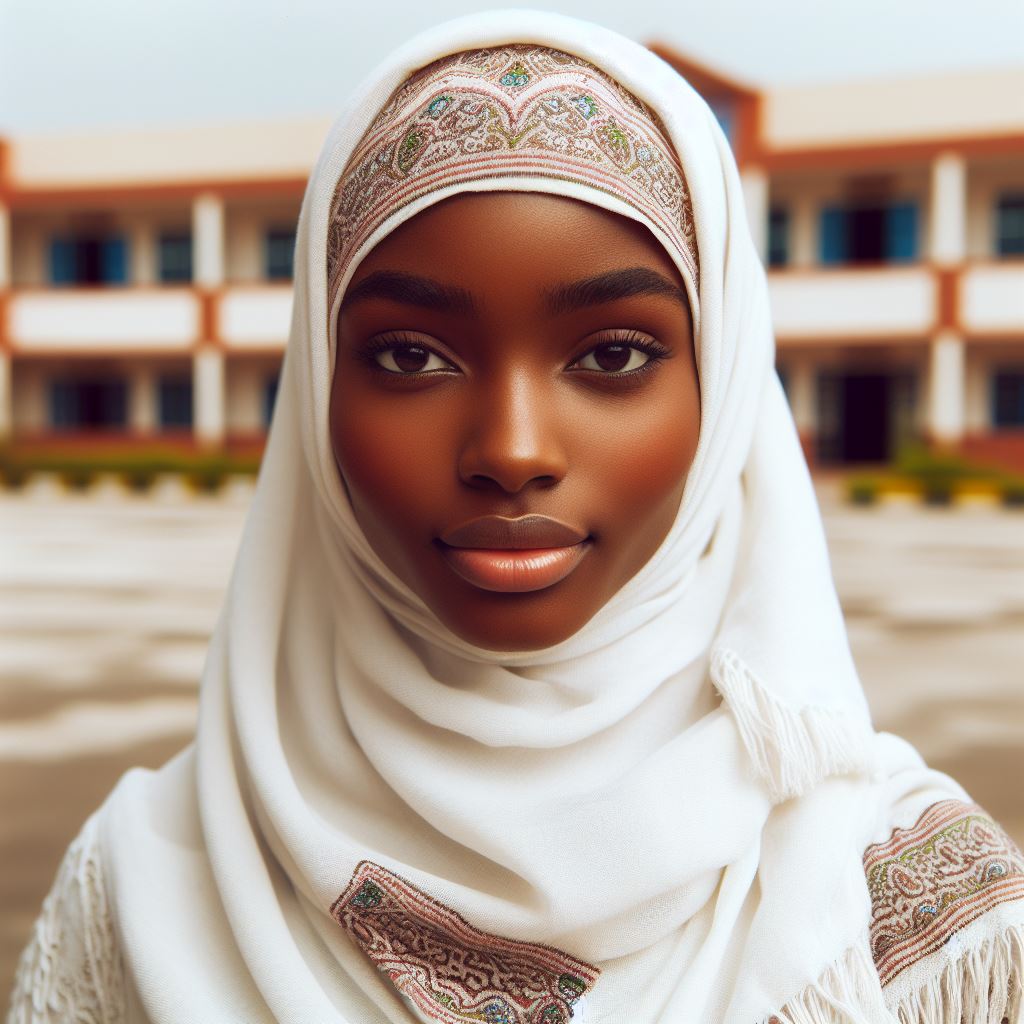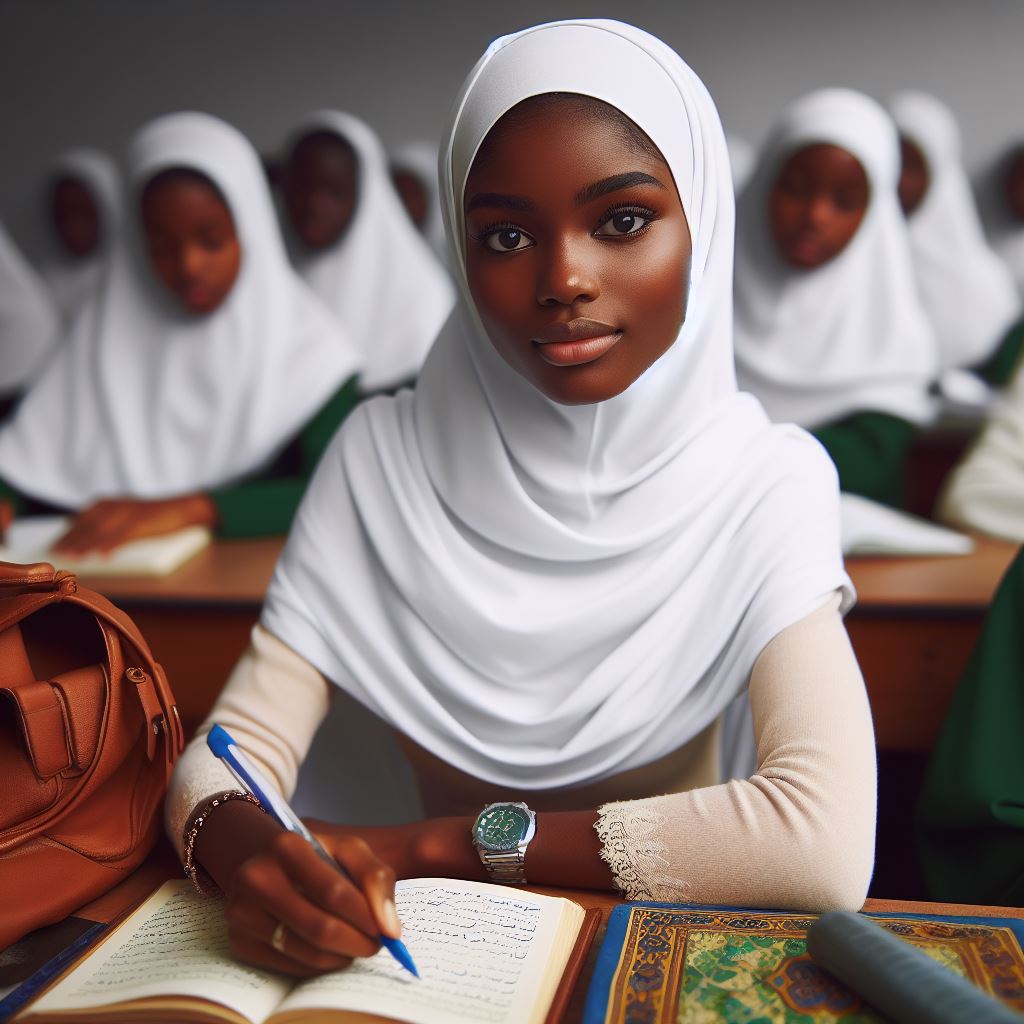Introduction
Arabic and Islamic studies have deep roots in Nigeria, dating back to the introduction of Islam in the 11th century.
Since then, these fields have become integral parts of both religious and educational frameworks.
Today, universities like Bayero University Kano and the University of Ilorin offer dedicated programs covering Islamic theology, jurisprudence, history, and the Arabic language.
For women in Nigeria, studying Arabic and Islamic studies holds significant importance.
Access to education in these areas empowers women, allowing them to become informed and active participants in their communities.
They contribute to preserving Nigeria’s cultural and religious heritage and can assume leadership roles within their communities as educators, counselors, and role models.
Proficiency in Arabic and knowledge of Islamic studies also offer economic opportunities, such as teaching, translation, and roles in religious and non-governmental organizations.
Overall, the inclusion of women in Arabic and Islamic studies contributes to societal growth and stability in Nigeria.
Role of Women in Islamic Education
Historical Background of Women’s Involvement in Islamic Education
Women have played significant roles in Islamic education throughout history.
From the time of the Prophet Muhammad, women were actively involved in transmitting Islamic knowledge.
Female companions of the Prophet, such as Aisha and Umm Salama, were renowned scholars who taught both men and women.
Throughout the centuries, women have contributed to the preservation and dissemination of Islamic knowledge through teaching, writing, and scholarly pursuits.
Challenges Faced by Women in Pursuing Islamic Education in Nigeria
In Nigeria, women pursuing Islamic education often encounter various challenges.
Societal norms and cultural beliefs may restrict women’s access to education, particularly in rural areas where traditional gender roles are more pronounced.
Additionally, limited educational infrastructure and resources pose obstacles to women seeking formal Islamic education.
Economic constraints, early marriage, and family responsibilities further impede women’s educational opportunities.
Success Stories of Women Excelling in Islamic Studies
Despite these challenges, numerous women in Nigeria have excelled in Islamic studies and made significant contributions to the field.
Women scholars like Aisha Lemu, who founded the Islamic Education Trust in Nigeria, have worked tirelessly to promote Islamic education for women.
Others, like Khadijah Gambo Hawaja, have become respected authorities in Islamic jurisprudence and theology, breaking barriers and inspiring future generations of women.
Moreover, grassroots initiatives and organizations have emerged to support women’s Islamic education.
These include women-led Quranic schools, community-based learning centers, and online platforms offering courses in Islamic studies.
Through determination, resilience, and community support, many women in Nigeria have overcome challenges to pursue their passion for Islamic education and contribute meaningfully to their communities.
In fact, women have played vital roles in Islamic education historically and continue to do so in Nigeria despite facing challenges.
Their contributions enrich the scholarly landscape and serve as examples of resilience and dedication in the pursuit of knowledge and religious understanding.
Read: Scholarships for Communication Arts Students in Nigeria
Opportunities for Women in Arabic and Islamic Studies
Scholarships and Grants Available for Women Studying Arabic and Islamic Studies
Women interested in pursuing a career in Arabic and Islamic studies have access to various scholarships and grants that can help them achieve their academic goals.
These financial aids are specifically tailored to support women in this field, encouraging them to excel in their studies and contribute meaningfully to academia.
Career Prospects for Women with a Background in Arabic and Islamic Studies
Having a background in Arabic and Islamic studies opens up a wide range of career opportunities for women.
Graduates can pursue careers in education, research, translation, journalism, diplomacy, and international relations.
With the increasing global relevance of Arabic and Islamic studies, women with expertise in this field are highly sought after in various sectors.
Importance of Encouraging More Women to Pursue Education in This Field
Encouraging more women to pursue education in Arabic and Islamic studies is crucial for fostering diversity and inclusivity in academia.
By empowering women to study and specialize in this field, we promote gender equality and ensure that diverse perspectives are represented in research and teaching.
Additionally, increasing the number of women in Arabic and Islamic studies can lead to innovative insights and contributions to the field.
In the end, women in Nigeria have ample opportunities in Arabic and Islamic studies, with scholarships, career prospects, and the importance of encouraging more women to pursue education in this field.
By supporting and empowering women in Arabic and Islamic studies, we can create a more inclusive and diverse academic environment that benefits society as a whole.
Read: Career Paths in Communication and Language Arts
Empowerment through Knowledge
How Education in Arabic and Islamic Studies Can Empower Women in Nigeria
Education in Arabic and Islamic studies can empower women in Nigeria in various ways.
Firstly, it provides them with religious and secular knowledge, enabling them to become informed and active participants in their communities.
This empowerment helps women challenge stereotypes and traditional gender roles, leading to greater gender equality and social progress.
Additionally, education opens up economic opportunities for women, allowing them to pursue careers in teaching, translation, and leadership roles within religious and non-governmental organizations.
Impact of Educated Women in the Community and Society
The impact of educated women in the community and society is profound.
Educated women serve as role models, inspiring younger generations to pursue education and break barriers.
They contribute to the intellectual and cultural development of their communities by sharing their knowledge and promoting critical thinking.
Moreover, educated women often act as agents of change, advocating for social justice, women’s rights, and community welfare.
Their leadership and activism contribute to the overall progress and stability of society.
Ways in Which Women Can Use Their Knowledge to Advocate for Change and Progress
Women can use their knowledge in Arabic and Islamic studies to advocate for change and progress in various ways.
Firstly, they can engage in community outreach and education programs to promote literacy, religious tolerance, and women’s rights.
Secondly, they can participate in interfaith dialogues and initiatives to foster understanding and cooperation among different religious communities.
Additionally, educated women can use their platforms to address social issues such as poverty, healthcare, and environmental sustainability, advocating for policies and programs that benefit their communities.
Generally, education in Arabic and Islamic studies empowers women in Nigeria by providing them with knowledge, opportunities, and a platform for advocacy.
The impact of educated women extends beyond individual empowerment, influencing community development, social change, and progress towards a more inclusive and equitable society.
Read: Global Impact of African and Asian Studies Research
Learn More: How to Start a Blog as a Mass Communication Student
See Related Content: Insights from Successful Nigerian Film Directors
Uncover the Details: Admission Requirements for Criminology in Nigeria
Learn More: Conference Highlights in African and Asian Studies
Challenges and Barriers
Cultural and Societal Barriers Faced by Women Studying Arabic and Islamic Studies
Women studying Arabic and Islamic studies in Nigeria often face significant cultural and societal barriers that hinder their educational pursuits.
These barriers are deeply rooted in traditional gender norms and expectations within the Nigerian society.
One of the main challenges faced by women is the prevailing belief that their primary role should be in the domestic sphere, rather than pursuing higher education or engaging in intellectual pursuits.
This mindset can discourage women from fully dedicating themselves to their studies.
Furthermore, there is a lack of support and encouragement for women in these fields, particularly from family members and community members who may not value the importance of education for women.
This lack of support can greatly impact a woman’s confidence and success in her academic pursuits.
In addition, women studying Arabic and Islamic studies may face discrimination and prejudice from their male counterparts or instructors.
This can create a hostile learning environment that makes it difficult for women to excel in their studies and feel valued as scholars.
Lack of Representation of Women in Leadership Roles in Islamic Institutions
Another significant barrier faced by women in Arabic and Islamic studies in Nigeria is the lack of representation of women in leadership roles within Islamic institutions.
This lack of representation can limit women’s opportunities for advancement and influence within the field.
Women often find themselves underrepresented in decision-making positions, such as board memberships, administrative roles, and teaching positions.
This lack of representation perpetuates gender inequality and limits women’s ability to enact positive change in the field.
Furthermore, the absence of female role models in leadership disheartens women pursuing careers in Arabic and Islamic studies.
Without women in authority positions, women feel discouraged or believe leadership roles are unattainable.
Strategies to Overcome These Challenges and Promote Gender Equality in Education
To address the challenges and barriers faced by women in Arabic and Islamic studies in Nigeria, it is essential to implement strategies that promote gender equality and support women in their educational pursuits.
One key strategy is to advocate for greater representation of women in leadership roles within Islamic institutions.
By actively recruiting and promoting women to positions of authority, institutions can create a more inclusive and diverse environment that empowers women to excel in their studies and careers.
Additionally, efforts should be made to challenge and dismantle traditional gender norms and expectations that limit women’s educational opportunities.
This involves community outreach, raising awareness, and running educational programs highlighting the importance of women’s equal access to education.
Moreover, creating support networks and mentorship programs for women studying Arabic and Islamic studies can provide invaluable guidance and encouragement to help women navigate the challenges they may face.
By fostering a strong sense of community and solidarity among women scholars, institutions can help women thrive in their academic pursuits.
Promoting gender equality in Arabic and Islamic studies in Nigeria requires addressing cultural and societal barriers. We must increase the representation of women in leadership roles. Providing support and mentorship to women scholars is essential.
These strategies create an inclusive and empowering educational environment. Women can pursue their academic and professional aspirations.
Read: Language Learning in African and Asian Studies

Gain More Insights: How to Succeed in Communication Studies Programs
Support Systems for Women in Arabic and Islamic Studies
Importance of Mentorship and Networking for Women in this Field
Mentorship and networking play a crucial role in supporting women in Arabic and Islamic studies.
Having mentors who are experienced in the field can provide guidance, advice, and encouragement to women pursuing their studies.
Mentors can help navigate challenges, offer insights, and provide support in various aspects of academic and professional life.
Networking allows women to connect with peers, experts, and potential collaborators, expanding their knowledge and opportunities in the field.
Building a strong network can lead to collaborations, research opportunities, and access to resources that can enhance women’s academic and professional growth.
Organizations and Initiatives Supporting Women’s Education in Arabic and Islamic Studies
There are several organizations and initiatives dedicated to supporting women’s education in Arabic and Islamic studies.
These organizations provide scholarships, mentorship programs, research grants, and networking opportunities for women in the field.
They promote gender equality, diversity, and inclusivity in academia, creating a supportive environment for women to excel in their studies.
By partnering with universities, research institutions, and government agencies, these organizations advocate for policies and programs that empower women in Arabic and Islamic studies.
Their efforts contribute to the advancement of women in academia and promote female representation in this field.
Creating a Supportive and Inclusive Environment for Women to Thrive in their Studies
To create a supportive and inclusive environment for women in Arabic and Islamic studies, it is essential to promote gender equity, diversity, and mutual respect.
Universities and academic institutions should implement policies and programs that support women’s academic and professional development.
This includes providing mentorship opportunities, creating networking events, and offering resources tailored to women’s needs.
By fostering a culture of inclusivity and support, institutions can empower women to pursue their studies with confidence and success.
Encourage collaboration, teamwork, and mutual support among students, faculty, and researchers to enhance women’s academic experiences. Promote women’s contributions to Arabic and Islamic studies.
Find Out More: How to Write a Winning Film Script in Nigeria
Conclusion
In conclusion, the active participation of women in Arabic and Islamic studies in Nigeria is crucial for the advancement of education and the promotion of gender equality.
Women bring a unique perspective and contribution to the field, enriching the academic discourse and fostering a more inclusive learning environment.
It is essential to empower more women to pursue education in this field, providing them with opportunities for growth, development, and leadership.
By encouraging and supporting women in their academic endeavors, we can create a more diverse and equitable educational landscape in Nigeria.
In closing, our hope is for a future where gender equality is achieved in all aspects of education and society.
We envision a world where women and men have equal opportunities to excel in their chosen fields, where their voices are heard, and their contributions are valued equally.




